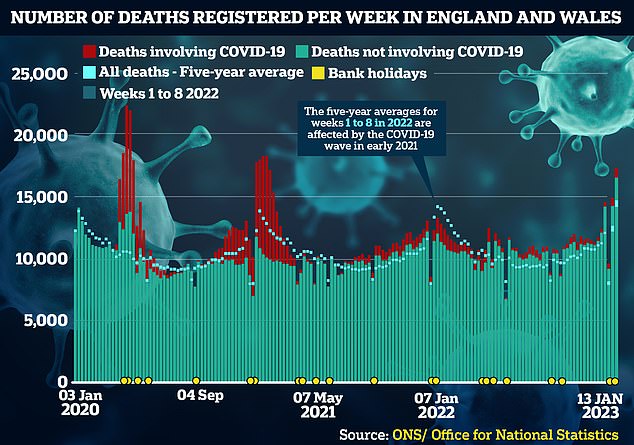
British MPs are urging an urgent investigation into the surging death rates in the country, as over 17,000 deaths were registered in England and Wales in the seven days to January 13 – 2,837 above the average for that time of year. This marks the highest number of excess deaths since February 12, 2021. Notably, the excess deaths are not primarily driven by Covid-19, which accounted for just 5% of the total, but are likely influenced by factors such as ambulance delays, long waits in A&E, unmet needs during the pandemic, and significant backlogs for routine NHS care.
The Royal College of Emergency Medicine has warned that up to 500 people a week are dying due to ambulance and treatment delays. Labour’s shadow public health minister accused the government of “denial and buck-passing,” and the Conservative former minister Esther McVey called for an “urgent and thorough investigation” into the excess deaths.
Health minister Maria Caulfield argued that there are clinical reasons for excess deaths, not political ones, and mentioned that the UK’s mortality figures are comparable to other European countries. However, the calls for an investigation highlight concerns about the impact of the pandemic on the healthcare system and the need to address potential systemic issues affecting patient care.
This winter has seen a sharp spike in excess deaths, with numbers 21% and 20% above average in the last two weeks of December, followed by 14% and 20% in the first two weeks of January. The Royal College of Emergency Medicine’s claim that delays to emergency care are killing hundreds of people a week has added to the urgency of the situation. Data from NHS England revealed that a record 54,532 people waited more than 12 hours in A&E departments last month from a decision to admit to actually being admitted. The proportion of patients seen within four hours in England’s A&Es fell to a record low of 65% in December.
In addition to the strain on emergency care, concerns have been raised about the impact on routine healthcare. The Chief Medical Officer warned that non-Covid excess deaths are partly driven by patients not getting statins or blood pressure medicines during the pandemic. The Royal College of Emergency Medicine’s president, Dr. Adrian Boyle, defended the college’s claim that delays to emergency care are killing hundreds of people a week, stating that the system has serious structural problems impairing its ability to deliver urgent and emergency care.
The situation has prompted calls for improvements to NHS 111 to prevent unnecessary A&E visits, as well as for hospitals to share the burden of an influx of patients by admitting more onto wards. There are also concerns about the exodus of emergency care nurses, indicating a need for broader systemic changes to address the challenges faced by the healthcare system.
While the government emphasizes the clinical reasons for excess deaths and compares the UK’s mortality figures to other European countries, the urgency of the situation underscores the delicate balance between managing public health and ensuring a robust healthcare system. Addressing the systemic issues contributing to excess deaths will be crucial for restoring confidence in the healthcare system and safeguarding patient care.
RELATED ARTICLES
- EVs pollute 1850 times more than Fossil Fuel cars according to new study
- UK Warns that China is Preparing for Total Nuclear War with the West
- Jacob Rothschild Dies At Age 87
- UK Government-Funded Study Found Virtually No Dental Benefit From Fluoridation
- UK Elderly Couple Ordered in a Council Letter to Sell Their House as its Needed to House Migrants











